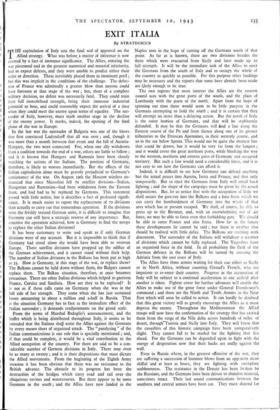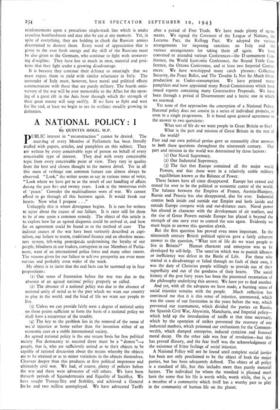EXIT ITALIA
By STRATEGICUS
In the last war the surrender of Bulgaria was one of the blows that first convinced Ludendorff that all was over ; and, though it was more than a month between that event and the fall of Austria- Hungary, the two were connected. For, when one ally withdraws from a coalition towards the-end of a war, others are liable to follow ; and it is known that Hungary and Rumania have been closely watching the actions of the Italians. The position of Germany, therefore, is likely to worsen immediately. But the effects of the Italian capitulation alone must be gravely prejudicial to Germany's continuance of the war. On August 19th the Moscow wireless an- nounced that since Mussolini fell 7o satellite divisions—Italian, Hungarian and Rumanian—had been withdrawn from the Eastern front, and. had had to be replaced by Germans. This statement passed with little notice, but it describes a fact of profound signifi- cance. It is much easier to report the replacement of 70 divisions than actually to carry out that tremendous operation. If the divisions were the freshly trained German units, it is difficult to imagine that Germany can still have a strategic reserve of any importance. But, conceive the operation achieved, how is Germany to find the troops to replace the other Italian divisions?
It has been customary to write and speak as if only German divisions were of any account. But it is impossible to think that if Germany had stood alone she would have been able to overrun Europe. These satellite divisions have propped up the edifice of the German achievement, and it cannot stand without their help. The number of Italian divisions in the Balkans has been put as high as 25. How is Germany, at this stage of the war, to replace them? The Balkans cannot be held down without them, the Bulgars cannot replace them. The Balkan situation, therefore, at once becomes precarious. There are other Italian divisions which helped to garrison France, Corsica and Sardinia. How are they to be replaced? It is not as if these calls came on Germany when she was in the full tide of her strength. They come when she has just sustained losses amounting to about a million and a-half in Russia. That is the situation Germany has to face as the immediate effect of the Italian surrender ; it demands readjustments on the grand scale.
From the terms of Marshal Badoglio's announcement, and the leaflet which is being distributed throughout Italy, it seems to be intended that the Italians shall assist the Allies against the Germans by every means 'short of organised attack. The " paralysing " of the Italian communications is one role that is specially mentioned ; and, if that could be complete, it would be a vital contribution to the
Allied occupation of the country. For there are said to be a con- siderable number of German divisions in Italy. There may even be as many as twenty ; and it is their dispositions that must dictate the Allied movements. From the beginning of the Eighth Army
invasion it has been obvious that there was no resistance to the British advance. The obstacle to its progress has been the destruction of the bridges which carry road and rail over the ubiquitous ravines and watercourses. But there appear to be some Germans in the south ; and the Allies have now landed in the Naples area in the hope of cutting off the Germans south of that point. As far as is known, there are two divisions besides the three which were evacuated from Sicily and later made up to full strength. It will be the immediate task of the Allies to eject the Germans from the south of Italy and to occupy the whole of the country as quickly as possible. For this purpose other landings may be necessary and the reports that some have already been made are likely enough to be true.
The two regions that most interest the Allies are the eastern coastal area with the great ports of the south, and the plain of Lombardy with the ports of the north. Apart from the hope of spinning out time there would seem to be little purpose in the Germans attempting to hold the south ; and it is certain that they will attempt no more than a delaying action. But the north of Italy is the outer bastion of Germany, and that will be stubbornly defended. It may be that the Germans will find a line along the Eastern course of the Po and from thence along one of its greater tributaries to the Etruscan Apennines, in their westerly course, and so to the sea below Spezia. This would not be quite the shortest line that could be drawn, but it would be very far from the longest ; and it would cover the great northern ports, while blocking the way to the western, northern and eastern gates of Germany and occupied territory. But such a line would need a considerable force, and it is not easy to see how the Germans can afford it Indeed, it is difficult to see how Germany can defend anything but the actual passes into Austria, Istria and France, and that only temporarily. But to eject the Germans from Italy will entail hard fighting ; and the shape of the campaign must be given by the actual dispositions. But, let us notice that with the occupation of Italy we shall secure the gate way into the Balkans and a base from which we can carry the bombardment of Germany into the whole of that area which has at present escaped. We shall, of course, be able to press up to the Brenner, and, with an overwhelming use of air force, we may be able to force even that forbidding gate. We should be able to enter France and also Istria. How far in the future these developments lie cannot be said ; but there is another that should be realised with little delay. The Balkans are seething with discontent. The surrender of the Italians will withdraw a number of divisions which cannot be fully replaced. The Yugoslays have an organised force in the field. In all probability the flank of the German defence in the Balkans will be turned by crossing the Adriatic from the east coast of Italy.
The Allies have three armies waiting for their cue either in Sicily or in North Africa, without counting Giraud's French, who are impatient to re-enter their country. Progress in the occupation of Italy will be subject to a continual acceleration as one airfield after another is taken. Fighter cover for further advances will enable the Allies to make use of the great force under General Eisenhower's command ; and there are the Ninth and Tenth Armies in the Near East which will soon be called to action. It can hardly be doubted that this great victory will as greatly encourage the Allies as it must depress the enemy. Throughout the Mediterranean the Allied troops will now have the confirmation of the strategy that has carried them from the verge of the Nile delta across hundreds of miles of
desert, through-Tunisia and Sicily into Italy. They will know that the casualties of this historic campaign have been comparatively
slight. They cannot fail to be steeled for the fighting that lies ahead. For the Germans can be depended upon to fight with the energy of desperation now that their backs are really against the wall.
Even in Russia where, in the greatest offensive of the war, they are suffering a succession of hammer blows from an opponent more skilful and at least as brave, they are fighting with exemplary stubbornness. The resistance in the Donetz has been broken by the Russians, and the Germans have been driven to abandon material, sometimes intact. Their last sound communications between the southern and central armies have been cut. They must depend for reinforcements upon a precarious single-track line which is under ceaseless bombardment and may also be cut at any moment. Yet, in spite of everything, they are holding in check the Russian armies determined to destroy them. Every word of appreciation that is given to the ever fresh energy and the skill of the Russians must be also given to the Germans, who continue to fight with unwaver- ing discipline. They have lost so much in men, material and posi- tions that they fight under a growing disadvantage.
It is because they continue their defence so amazingly that we must expect them to yield with similar reluctance in Italy. The surrender of Italy must, however, have moral and political effects commensurate with those that are purely military. The fourth .anni- versary of the war will be ever memorable to the Allies for the open- ing of a great rift in the Axis front through which the strength of their great enemy will seep swiftly: If we have to fight and wait for the end, at least we begin to see its ovtlines steadily growing in definition.



























 Previous page
Previous page